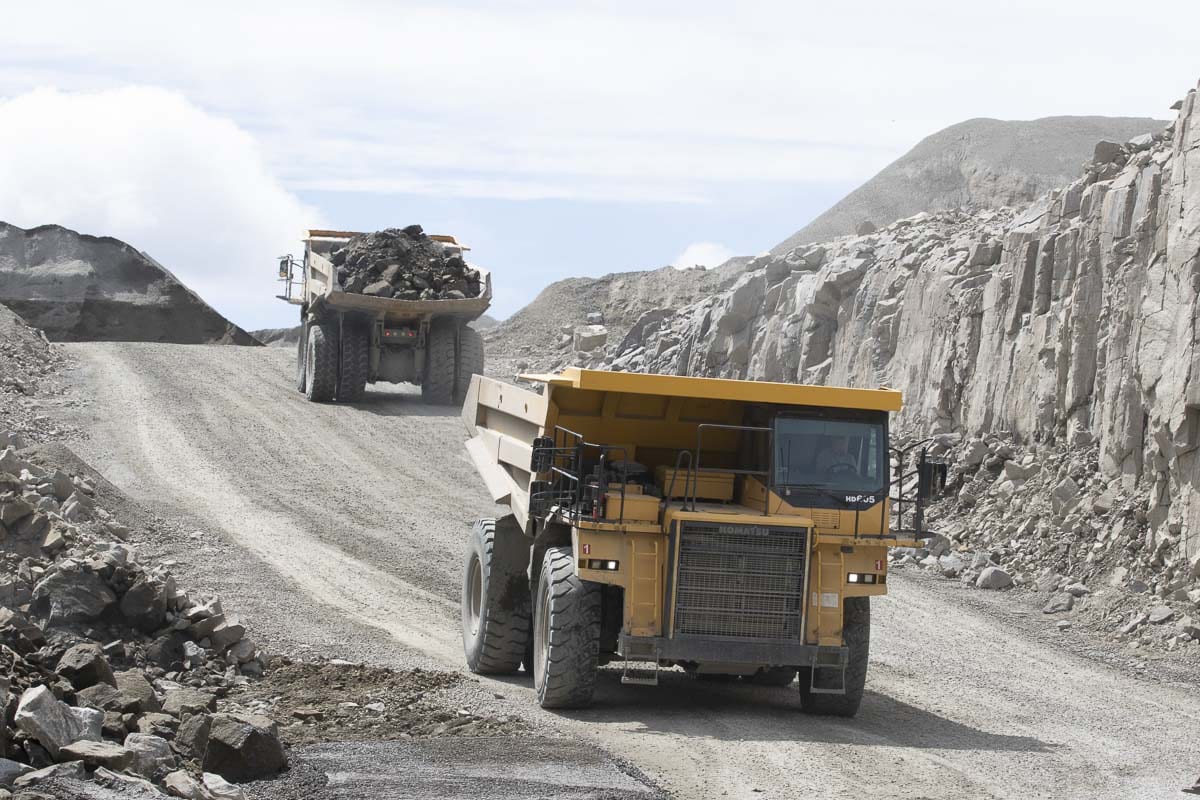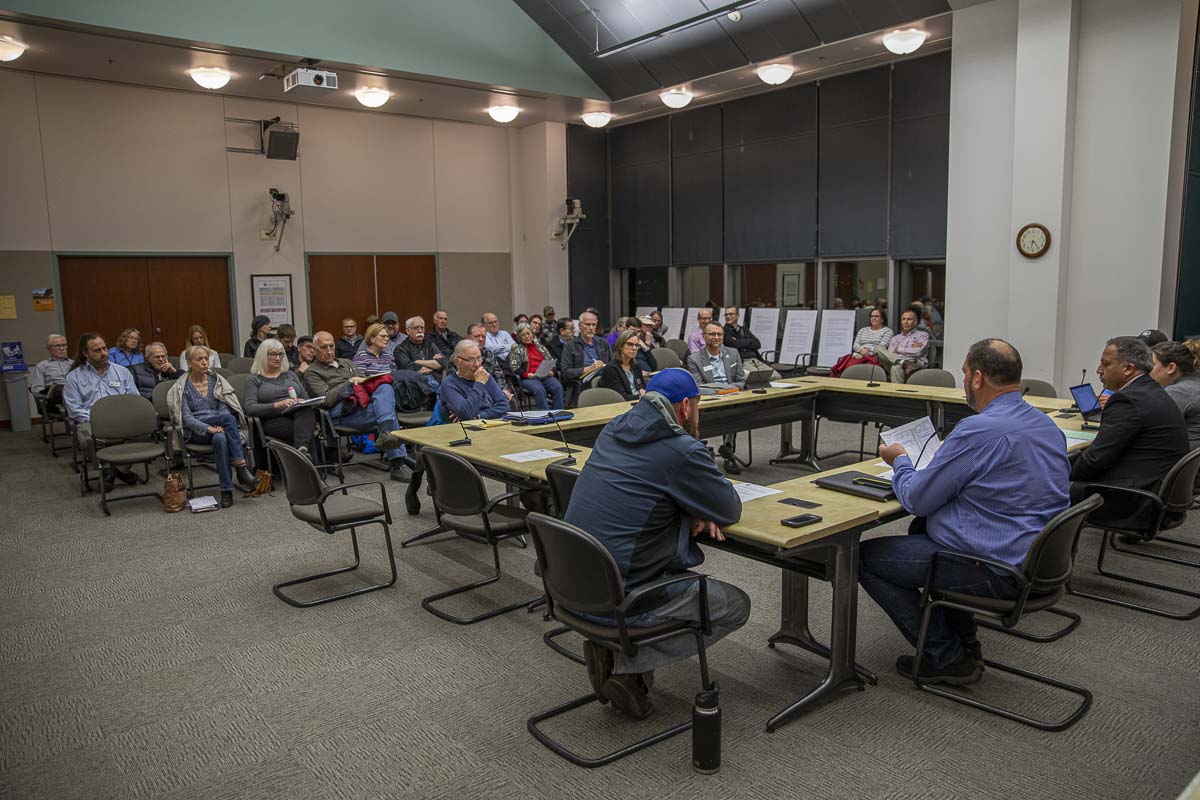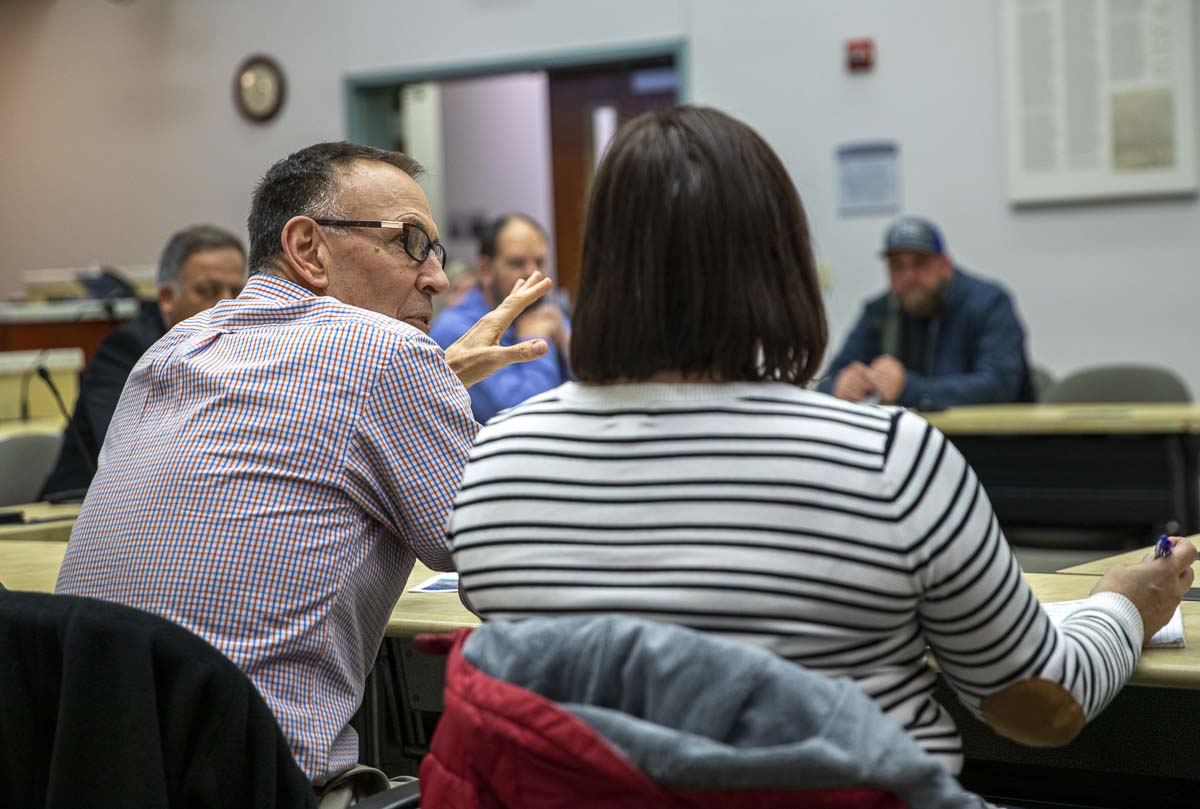Three quarries bring starkly different community responses at February committee gathering
VANCOUVER — A noticeable dichotomy defined the Surface Mining Advisory Committee’s (SMAC) Feb. 25 meeting as attendees heard from Cadman, Inc. officials about expansion of their Lewisville mine, and directed concerned questions to JL Storedahl and Sons, which operates both Yacolt and Livingston Mountain quarries.

For the better part of the last year, the SMAC, which is moderated and organized by Clark County, has sought to bring neighbors and operators to the table to rectify many contentious relationships caused by mining operations in the county.
This month, the opening topics comprised the first dichotomous half of the evening. Cadman, a sand and gravel company owned by Lehigh Hanson and a member of the Heidelberg Cement Group, explained its plan to apply for expansion of their existing operation at the Lewisville pit along WA-503.
“Traffic access points in and out of the mine, on all the routes, will stay consistent with current operations. So there’s no proposal to change any of that,” said Chuck Rose, the operator of the pit. “Where we’re processing the aggregates will stay the same, that’s not going to change at all. And the amount of aggregates that we produce will remain pretty consistent with what we’ve been doing in the past.”

The expansion would move operations north into an area that is partly forested and partly sparsely vegetated. In addition to the expansion, Cadman plans to mine 20 feet deeper in the existing mining area, Rose said. Traffic quantity, access points, truck routes will remain unchanged if the expansion goes through, he said.
Cadman officials also relayed their plans to conduct an archaeological survey as well as noise, traffic, wetland delineation, habitat assessment, and geological hazard assessment studies and surveys. Many of which are required by the expansion application process.
After Rose and McDonough concluded their presentation, the question time garnered an inquisitive response. Many in attendance were neighbors of either Yacolt Mountain or Livingston Mountain quarries, and inquired of Cadman officials how their operation maintained a non-contentious relationship with their community.
“You mentioned you’re limited in the number of trucks you produce and such things, what is the permit that governs your operation now? Second question is, how is it that you get along with your neighborhood and we don’t get along with our operators?” said Gregory Shaw, a Livingston Mountain neighbor.
Rose’s response was two-fold as well as reserved.
“No comment on that one,” Rose said. “We operate under a conditional use permit. We leased the site and we’re going to expand that lease on our lessor’s property. Over the last 20 years, we’ve had some neighbors that call us up about noise and we’ll investigate and there may be something that we can do to mitigate it for them. But yeah, so that’s how we deal with it.”

Adding to the dichotomy, one neighbor expressed gratitude and support of Cadman for their willingness to meet with several people in the area the previous week and discuss the proposal prior to beginning the application process with the county.
Following the exchange, the second half of the evening began with newly titled Code Enforcement Director Mitch Nickolds asking neighbors of Livingston and Yacolt Mountain quarries to come forward with questions and concerns.
Among the largest concerns expressed, several new arguments surfaced, including concern over operation of the Storedahl quarries on legal holidays (most recently MLK and Presidents Day), concern over inconsistencies from Environmental Protection Agency (EPA) testing and past private testing as well as truck trip counts.
Beginning with the latter, truck trips were being surveyed through the county using proprietary cameras and software known as Miovision, according to Megan Reed from Clark County Public Works. Two cameras ran for five days a week for the last several months, with one on the entrance of the mine at Yacolt Mountain and one on Kelly Road below Yacolt Mountain. Then things went awry.
“What we realized is that the software didn’t have the ability to distinguish between a truck and pup and a single truck. So trucks and trailers were being counted twice as opposed to only being counted once. So the counts that the software was able to provide for us, those were not accurate numbers,” Reed said. “At this point, it would take somebody having to sit down and watch all of that film eight hours a day, and we don’t have the staff to do that at this time.”
When asked by a Yacolt Mountain neighbor about volunteers counting trucks on film or otherwise, Ahmad Qayoumi, director of Clark County public works, said such a person would have to be certified to ensure impartiality and accuracy.

On the subject of environmental testing, Yacolt Mountain neighbor Gary Ogier weighed in on his concerns regarding what he thinks are inconsistencies in testing. In July of 2019, the EPA tested in 12 sites around the Yacolt Mountain mine for naturally occurring asbestos-like minerals. In results released in November of 2019, the EPA found no such minerals.
In two other previous tests, one by a private testing agency, the other by a friend of a Ogier’s, allegedly harmful substances were found to be present. Ogier, along with neighbor Richard Dyrland, said they feel uncertain about the EPA results, since they were different than theirs.
“We’re all relieved that the current testing was clean, but I think that doesn’t mean we shouldn’t require periodic testing of either the overburden pile or as the new layers are considered to be mined,” Ogier siad. “As a follow up to the good news of those studies is, I think we need to keep looking.”
In response, Bo Storedahl of JL Storedahl and Sons, inquired as to who, exactly, conducted the previous testing and if those results could be directly compared to those of the EPA. There was no firm answer from Ogier or Dyrland, but they said they could attempt to speak with the previous testers.
“I would think follow up testing would be appropriate if there was reason to suspect it existed in the first place. I don’t know who pulled the samples that you’re referring to,” Storedahl said. “I think seeing that, and then comparing that to the EPA samples could give us some direction, but to just to say we need to just keep sampling, I mean, you could ask EPA do that, but I think they made it clear that they were not concerned.”
With regard to operations on legal holidays, the stance of code enforcement was that MLK and Presidents Day were among the days not allowing operation. The fine for violation was mentioned in the meeting to be $500.
Storedahl explained to the committee that only one conditional use permit (CUP) of the three held between Yacolt and Livingston, stipulates no work on legal holidays. He went on to add the fact that the private sector, with whom he operates, does not take many of the government listed legal holidays off; causing a major mismatch.
This discussion lead into the bulk of the evening’s conversation on Livingston Mountain and Livingston quarries. Perhaps most encompassing within that time, was discussion of the litany of contracts, CUPs and permits existing at Livingston.
Officially, the quarry is actually two mines, from before Storedahl, when two separate companies operated there. Now, with only Storedahl mining in both locations, and the larger of the two nearly mined out, Tower Rock Products is responsible for the contract with Clark County, which is then leased to Storedahl.
Shaw expressed considerable frustration with the lack of communication from Tower Rock, who he and many other neighbors see, as the responsible party for allowing the hundreds of truck trips and two operations to continue.
Storedahl expressed support for Tower Rock and confidence that the conclusion phase of operations on Livingston Mountain would be on time with their finish date of Dec. 31, 2020. At that point in time, reclamation, which is already underway, would continue and the source of material at Livingston would be classified by the county as expended.
The date and time of the next SMAC meeting will be posted on the county website in the coming weeks. ClarkCountyToday.com is also nearing completion of the documentary series on Yacolt Mountain Quarry. Be sure to check back soon for its premiere.




